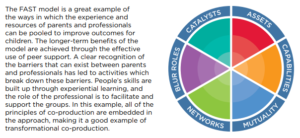
One of the case studies mentioned is that of the Families and Schools Together (FAST) project also hosted at Middlesex. https://www.mdx.ac.uk/news/2015/04/fast-programme-grows-up
FAST is an eight week group programme facilitated by multiple agencies and peers to support families who need a bit of extra help. It has been tested in a range of settings: with first-time teenage parents, young people on the verge of exclusion, and families at risk of becoming involved with social care services. It is based on building relationships across the social ecology of family, schools and community.
FAST is a values-based programme with a strong assets focus that explicitly encourages reciprocity between participants.
• Reciprocity can be explicitly built into models: in FAST, there are explicit expectations set of people’s contributions and everyone is encouraged to support each other and the programme after they leave. Do you work to celebrate people’s capabilities? Are the service users you work with expected to make use of their skills and opportunities identified for them to give back?
• Programmes can be successfully replicated and scaled up across geographical and sector boundaries: the FAST model clearly distinguishes between critical components of the model, and aspects that can be tailored to local context. If you are thinking about taking inspiration from case studies in this catalogue, ask yourself; which parts of the process are central to the model, and which parts would benefit from being more tailored to local conditions?

